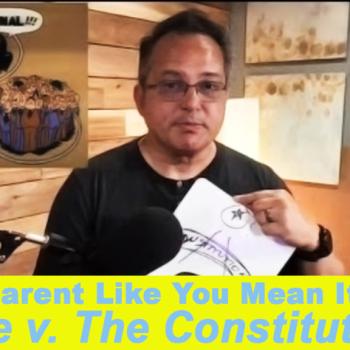When we last left Saul and his son, Jonathan, the Israelite army was under-manned, out-gunned and full of fear. So much, that the soldiers ran and were hiding behind rocks and in wells. They had lost hope.
This, week, we pick up the story in 1 Samuel 8:
8 Saul waited there seven days for Samuel, as Samuel had instructed him earlier, but Samuel still didn’t come. Saul realized that his troops were rapidly slipping away. 9 So he demanded, “Bring me the burnt offering and the peace offerings!” And Saul sacrificed the burnt offering himself.
Now, we’ve talked before about the “rounded characters” of 1 Samuel – Saul being one of the people that we can sympathize with. And if there’s anywhere in the Bible that we can sympathize with the guy, it’s right here. He knew what was needed. He waited for a week for Samuel to arrive. He obeyed the prophet’s instructions. But then he took inventory of everything that he was up against and thought that his current game plan just wasn’t working out for him.
Then he made the dreadful decision to do the wrong thing.
Now, in the Bible, there was another King who found Himself up against insurmountable odds. He prayed and waited and prayed and waited and prayed and waited. And God didn’t show up for Him, either.
And we’ll finish His story in just a bit.
But, getting back to Saul, Saul gave into his fear. He basically reacted out of his “fight or flight” instinct with the false supposition that the outcome of his situation was in his own hands, not God’s.
Don’t we often make the same mistake?
What did Saul do wrong? Well, in the days of the Old Testament, no one but the priests were allowed to sacrifice the burnt offering. Not even the king. This was the law. So, then we see what happens next in verse 10:
10 Just as Saul was finishing with the burnt offering, Samuel arrived. Saul went out to meet and welcome him, 11 but Samuel said, “What is this you have done?”
Saul replied, “I saw my men scattering from me, and you didn’t arrive when you said you would, and the Philistines are at Micmash ready for battle. 12 So I said, ‘The Philistines are ready to march against us at Gilgal, and I haven’t even asked for the Lord’s help!’ So I felt compelled to offer the burnt offering myself before you came.”
This is a textbook study of how we justify ourselves, our poor decisions, and our bad behavior.
Firstly, Saul casts the blame on Samuel rather than acknowledging his own impatience, and nothing ever goes right when you slap blame on the man ordained to speak for God. Then he makes excuses based on his own perspective in order to rationalize his decision.
Saul said that he “felt compelled” to make his move when and how he did, even without following God’s instructions.
13 “How foolish!” Samuel exclaimed. “You have not kept the command the Lord your God gave you. Had you kept it, the Lord would have established your kingdom over Israel forever. 14 But now your kingdom must end, for the Lord has sought out a man after his own heart. The Lord has already appointed him to be the leader of his people, because you have not kept the Lord’s command.”
Samuel, just like God, responds to Saul’s actions, not his arguments. And just like Saul, our actions will reveal what we believe and where our hearts really lie.
So, how should we act when we feel like we’re backed up into a corner and it seems as though God isn’t answering our pleas for help.
I have found1 Peter 2:21-23 as a huge help in keeping God’s perspective in times like these:
21 For God called you to do good, even if it means suffering, just as Christ suffered for you. He is your example, and you must follow in his steps.
22 He never sinned,
nor ever deceived anyone.
23 He did not retaliate when he was insulted,
nor threaten revenge when he suffered.
He left his case in the hands of God,
who always judges fairly.
You see, just as I referenced earlier, Saul is being juxtaposed against Israel’s (and the world’s) true and rightful King: Jesus Christ.
There was a night when Jesus was backed into a corner. Where, left to His own human instincts, He probably felt compelled to take action. There was a night when he vehemently prayed that God would take the situation away from Him. And God didn’t answer. But, the end of Jesus’ prayer did not put His own comfort, desires or even safety at the front of the priority list, but God’s will. Jesus performed righteously, where Saul did not. And God’s plan was sufficient.
C.S. Lewis put it this way:
Does God then forsake just those who serve Him best? Well, He who served Him best of all said, near His tortured death, “Why hast thou forsaken me?” ‘When God becomes man, that Man, of all others, is least comforted by God, at His greatest need. There is a mystery here which, even if I had the power, I might not have the courage to explore. Meanwhile, little people like you and me, if our prayers are sometimes granted, beyond all hope and probability, had better not draw hasty conclusions to our own advantage. If we were stronger, we might be less tenderly treated. If we were braver, we might be sent, with far less help, to defend far more desperate posts in the great battle.
I think that about sums it up. Saul felt desperate, wedged into a corner. He couldn’t wait for God. Jesus was in a similar situation, followed God’s will and it resulted in our salvation!
For more encouraging and engaging podcasts and videos, visit the E-Squared Media Network at www.e2medianetwork.com














